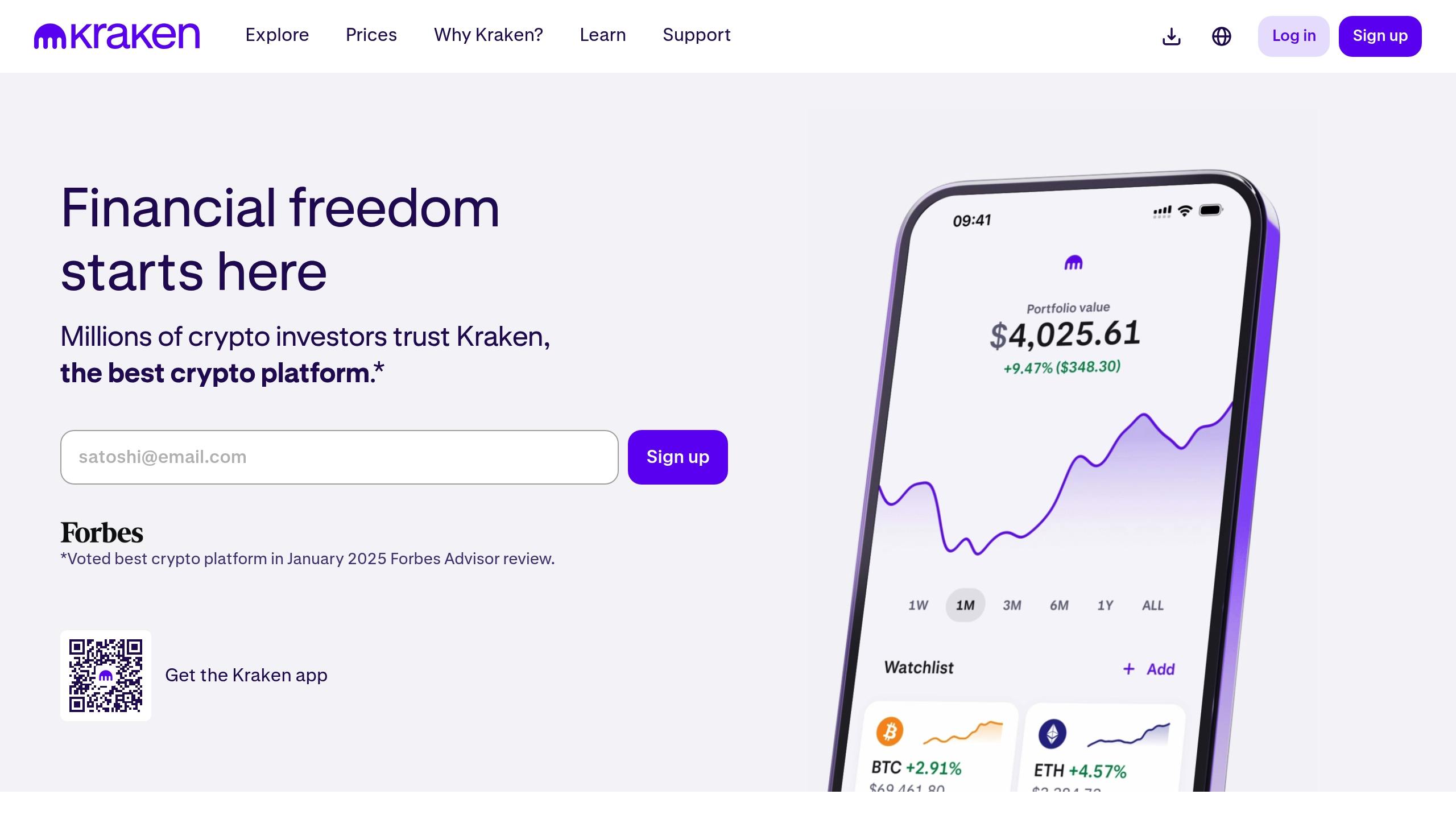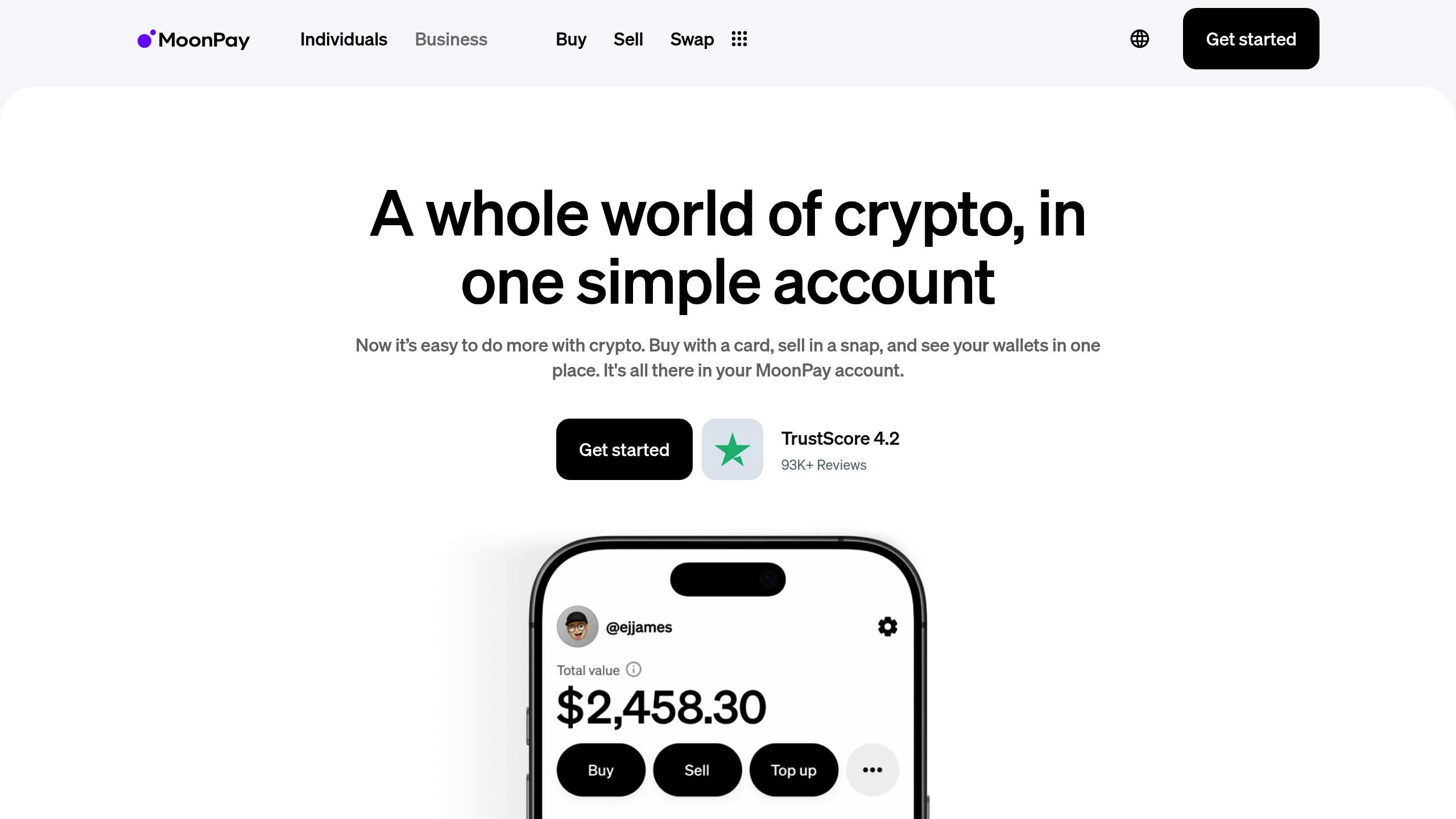Best onramp options for US residents.
Explore the best cryptocurrency onramp options for US residents, comparing fees, security, and user experience across top platforms.

Cryptocurrency onramps make it easy for US residents to exchange USD for digital assets. If you’re deciding between platforms, here’s a quick summary of the top options:
- Coinbase: Best for beginners with a simple interface, FDIC insurance, and educational tools. Fees range from 1.49% (ACH) to 3.99% (debit cards).
- Kraken: Ideal for advanced traders with low fees (0.16%-0.36% for Pro users) and advanced features like margin trading and staking. Not available in New York or Washington.
- MoonPay: Perfect for quick, direct wallet purchases but has higher fees (~7%) compared to traditional exchanges.
Quick Comparison
| Feature | Coinbase | Kraken | MoonPay |
|---|---|---|---|
| User Level | Beginner-friendly | Advanced traders | Quick buyers |
| Crypto Selection | 240+ | 200+ | 160+ |
| Fees (Standard) | ~3.74% | ~1.5% | ~7% |
| Payment Methods | ACH, Debit, Wire | ACH, Wire, Cards | Cards, Apple/Google Pay |
| Security | FDIC-insured USD, 98% cold storage | 95% cold storage, no major breaches | Non-custodial, PCI DSS standards |
| Availability | Nationwide | Not in NY/WA | Nationwide |
Each platform has its strengths: Coinbase is beginner-friendly, Kraken offers low fees for active traders, and MoonPay is convenient for direct wallet purchases. Choose based on your priorities like fees, security, and ease of use.
Kraken vs Coinbase: Which Crypto Exchange Is Better?

1. Coinbase
Coinbase stands out in the US market due to its strong focus on regulatory compliance, including holding the New York BitLicense[1]. The platform provides several options for secure fiat conversions, such as ACH transfers (1.49%), debit cards (3.99%), and wire transfers.
When it comes to security, Coinbase takes several measures to protect user funds:
- 98% of assets stored in cold wallets
- FDIC insurance for USD balances up to $250,000[1]
- Mandatory two-factor authentication (2FA) with biometric login
- AES-256 encryption and withdrawal address whitelisting
To meet compliance standards, all trading accounts must undergo full ID verification. Coinbase also offers educational tools like the Coinbase Learn program and the Earn feature, which allows users to learn about cryptocurrencies while earning some in return[1].
Another key feature is instant withdrawals, which are essential for traders who need quick access to decentralized exchanges (DEXs). This liquidity boost makes Coinbase a great option for transferring funds to DEXs, even though its fees are higher than some competitors. For US residents, these features make Coinbase a top choice.
2. Kraken
Kraken is a popular choice for US residents looking to trade cryptocurrencies. It operates as a licensed US Money Service Business, registered with FinCEN, and holds Money Transmitter Licenses in most states. However, it’s not available in New York or Washington due to specific state regulations[3][5].
While Coinbase focuses on ease of use, Kraken stands out for its lower costs, particularly on its Pro platform. Trading fees range from 0.16%-0.36%, while instant purchases come with a 1.5% fee for most cryptocurrencies and 0.9% for stablecoins[3][5].
Payment Methods and Fees
- ACH: Free, takes 1-3 days
- Wire Transfers: $5 deposit fee, processed same-day
- Cards/Apple/Google Pay: 1.5% fee, processed instantly
Kraken also prioritizes security, storing 95% of funds offline. While slightly lower than Coinbase’s 98%, Kraken has maintained a strong security record with no major breaches since its launch in 2011[3][5].
US users can access over 200 cryptocurrencies, including Bitcoin, Ethereum, and Solana[5]. Additional features include:
- Staking for 19 different coins
- Margin trading with up to 5x leverage
Verification is quick for basic access, taking just a few minutes, while full trading approval typically takes 1-5 days[5]. With its regulatory compliance, wide selection of assets, and competitive fees, Kraken is a solid choice for both beginners and seasoned traders.
sbb-itb-dd9e24a
3. MoonPay

MoonPay stands out by enabling direct wallet purchases through its API integrations, bypassing the need for traditional exchanges. US users can buy crypto directly into their personal wallets via over 100 integrated platforms, including MetaMask and Ledger Live[1][4]. It supports more than 80 assets, such as Bitcoin and popular stablecoins[7].
Payment Options and Fees
MoonPay offers several payment methods for US customers:
| Method | Speed | Fee |
|---|---|---|
| Credit/Debit Cards | Instant | Higher fees |
| Bank Transfers | 1-3 business days | Lower fees |
| Apple Pay | Instant | Higher fees |
| Google Pay | Instant | Higher fees |
While the platform provides convenience, its fees are significantly higher than those of traditional exchanges – often 2 to 4 times more. For example, a $200 purchase may incur a total fee of around 7%, as shown in a recent analysis. This includes a spread markup, with MoonPay quoting Bitcoin at $106,231.56 during the study[2].
Security and Integration
MoonPay is a non-custodial service, meaning it never holds users’ assets. It enforces mandatory identity verification and adheres to PCI DSS standards for secure payment processing[1][4].
Its strong wallet integration allows users to purchase crypto directly within DeFi platforms like Uniswap[1][4]. These integrations helped MoonPay win the title of ‘Best Cryptocurrency Purchasing Site’ at the 2021 Fintech Breakthrough Awards[7].
MoonPay offers a fast and convenient way to move from fiat to DeFi platforms. However, its higher fees make it a better fit for those who prioritize speed and ease over cost savings.
Platform Comparison
Let’s break down the major differences between these platforms to help you decide which one suits your needs best:
Key Features
| Feature | Coinbase | Kraken | MoonPay |
|---|---|---|---|
| Customer Support | 24/7 email, phone | 24/7 live chat, phone | Email support |
Fee Structure and Costs
| Transaction Type | Coinbase | Kraken | MoonPay |
|---|---|---|---|
| Standard Purchase Fees | 3.74% | 1.5% (0.9% for stablecoins) | ~7% |
| Price Spread | 0.5% | Not specified | 4.31% |
| Advanced Trading | 0-0.6% | 0-0.26% | N/A |
| Card Purchases | Additional fee | Additional fee | 3.75% + €0.75 |
Security and Support Features
| Security Feature | Coinbase | Kraken | MoonPay |
|---|---|---|---|
| Asset Protection | Cold Storage + FDIC | Cold Storage | Partner Custodians |
| FDIC Insurance | Up to $250,000 (USD) | No direct coverage | No direct coverage |
| Customer Support | 24/7 email, phone | 24/7 live chat, phone | Email support |
Platform Strengths
Coinbase
- Offers FDIC insurance for eligible accounts and provides educational resources for beginners.
Kraken
- Known for its low fees and tools geared toward professional traders.
MoonPay
- Simplifies the process with direct wallet integration, avoiding traditional exchanges.
Decision Factors
If security is your top priority, both Coinbase and Kraken deliver robust options. Coinbase adds an extra layer with FDIC insurance, while Kraken appeals to advanced traders with its lower fees. MoonPay, on the other hand, is ideal for those who prefer non-custodial solutions, thanks to its partnerships with regulated custodians [6].
Recommendations
Here’s how to choose the right platform based on your needs, considering fees, security, and accessibility:
For New Crypto Investors
If you’re just starting out, Coinbase is a great option. While the fees are around 3.74% for standard purchases[2], the platform’s educational resources make it beginner-friendly.
For Active Traders
For those who trade frequently or handle larger volumes, Kraken is a solid choice. Its advanced trading tools are designed for experienced users who need more sophisticated features.
For Convenience-First Users
Looking for the simplest way to buy crypto? MoonPay is your go-to platform. It’s ideal for:
- One-time buyers who want to skip traditional exchanges or need quick access to decentralized exchanges (DEX)
- Users requiring immediate access to their purchased crypto
Based on Transaction Size
| Transaction Size | Recommended Platform | Key Benefits |
|---|---|---|
| Under $1,000 | Coinbase | Offers multiple payment methods |
| $1,000 – $100,000 | Kraken | Provides advanced trading tools |
| Over $100,000 | Kraken OTC | Custom OTC pricing available[3] |
Security-Focused Users
If security is your priority, consider Coinbase for FDIC-insured USD balances or Kraken, which offers Proof of Reserves verification[3].
For State-Specific Access
Residents of New York and Washington should opt for Coinbase, as Kraken is not available in these states[5].
Cost-Conscious Users
To keep fees low:
- Use Kraken for regular trading, as it offers competitive pricing.
- Avoid credit card transactions, as they come with additional processing fees.
- Choose ACH transfers to minimize transaction costs.
Take these factors into account when selecting a platform that fits your needs.
FAQs
Is MoonPay cheaper than Coinbase?
No, MoonPay usually charges about twice as much in fees compared to Coinbase. For example, a $100 transaction comes with a 3.74% fee on Coinbase, while MoonPay’s fee is approximately 7%[2].
| Platform | Example Transaction | Total Fee |
|---|---|---|
| Coinbase | $100 purchase | 3.74% |
| MoonPay | $100 purchase | ~7% |
Here’s why MoonPay costs more:
- Spread difference: MoonPay has a maximum spread of 4.31%, compared to Coinbase’s 0.5%. Our analysis confirms this, showing MoonPay’s average spread at 4.31%, while Coinbase applies only a 0.5% markup.
- Instant purchases: These are significantly more expensive than using advanced trading options.
Your final cost depends on factors like payment method, transaction size, and market conditions. If saving money is your goal, Coinbase Advanced Trading is the better option. It’s a tradeoff between cost and convenience, depending on what you value most.






